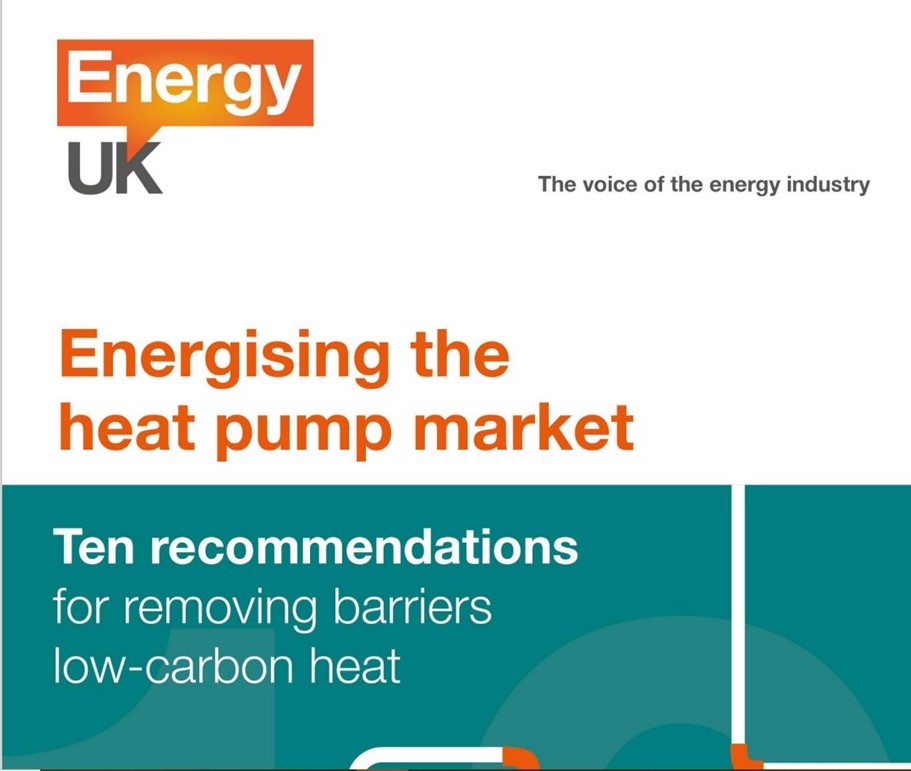Trade association Energy UK has released a report identifying ten policy enablers that will help remove current barriers to low carbon heat sources.
The report, titled Energising the heat pump market, addresses three core areas: finance, the consumer narrative and the net zero transition.
Current± summarised Energy UK’s ten recommendations below.
Finance
1. Extend the Boiler Upgrade Scheme
Launched in May 2022, the Boiler Upgrade Scheme (BUS) offers individual payments of £5,000 for households switching to a biomass boiler and £6,000 for those installing a ground source heat pump.
Various members of the industry, including the Ground Source Heat Pump Association and Lords Environment and Climate Change Committee, have reported that the BUS is failing to deliver.
The report pointed out that the scheme is not on track to spend its total budget this year, with an underspend of over £100 million of its original £450 million total budget over three years.
As recommended by the former energy minister, Chris Skidmore in the Net Zero Review, the report recommended that the BUS be extended to 2028 to help account for any supply chain issues that may have hindered delivery at the start of the scheme.
With the first year of the scheme drawing to a close, Energy UK also suggested that the Government consult with the industry and review its approach to help ensure that the target of delivering 30,000 new low-carbon heating systems a year is achieved.
Policies suggested include: Means-tested grants; bringing hybrid heating systems within scope; and increasing grant funding for specific technologies.
2. Increase awareness of the Social Housing Decarbonisation Fund
There are a number of schemes available to provide fuel poor and vulnerable households grant funding for the installation of heat pumps.
One of these is the Social Housing Decarbonisation Fund (SHDF). However according to the latest SHDF statistics published by the Department for Energy Security and Net Zero (DESNZ) in February 2023, no air source heat pumps have so far been installed.
To address this, the report recommends that the Government work with social housing providers to promote the available funding for low-carbon heating installations for heat pump ready homes under the SHDF.
3. Review the cost of energy bills
As high volatility continues across the energy market, UK households have been subject to ever rising energy bills in the midst of the cost-of-living crisis.
In its Heat and Buildings Strategy, the Government committed to “rebalancing energy prices”, a promise that was repeated upon the launch of DESNZ which established ‘ensuring security of energy supply and bringing down energy bills’ as one if its six key priorities.
To help uphold these commitments, Energy UK said it would “welcome the opportunity to hold a conversation between UK Government and industry regarding costs on bills.”
Topics of discussion suggested by the trade association include: retail market reform; replacing supplier obligations with a centrally-funded scheme; and incentivising the reduction of domestic energy consumption.
The Consumer Narrative
4. Enhance the Government’s online energy advice service
The report commended the UK Government’s new home energy MOT online advice service, as well as the ‘It All Adds Up’ campaign launched at the end of last, which gives consumer low or no-cost energy saving tips.
To spur further action, Energy UK recommended linking these advice services with local organisations and independent bodies that will be able to provide additional advice and tailored guidance for local areas and building types.
5. Expedite SAP updates in unison with Reduced Data SAP updates
The report described Energy Performance Certificates (EPCs) as a “crucial tool in the pathway to Net Zero buildings,” but warned that they are “not currently fit for purpose, and are contributing to low-carbon heating competing on an unlevel playing field with fossil fuel systems.”
At present, EPCs use out of date fuel prices, which means that the methodology by which the EPC is calculated (the Standard Assessment Procedure- SAP) rating can in some cases drop following the installation of heat pumps.
Energy UK suggested that the UK Government expedites the SAP update it announced was ongoing in the EPC Action Plan’s latest progress report. The organisation also shared its support of the Heat Pump Federation’s recommendation to complete this in unison with a Reduced Data SAP (RdSAP) update.
6. Review the approach to EPCs
Despite the urgent need to update both SAP and RdSAP methodology, the report also recognised that a broader outlook on how effective EPCs are in supporting customers improve their building heating system and insulation capabilities is also required.
“Government must work with industry and consumer groups to expedite progress on the EPC Action Plan,” wrote Energy UK.
“While consulting on what a fresh approach to EPCs, their data and usage should be, to ensure that this vital tool is fit for purpose in aiding the transition to Net Zero buildings.”
7. Legislate the gas boiler phase-out beyond 2035
To contribute to attractive new products, services and incentives already provided by the energy industry to disrupt the existing heating market, the report called for a stronger regulatory picture to help set a timeframe for the ongoing transition.
Whilst supporting the Government’s target of phasing out gas boilers beyond 2035, Energy UK maintained that the policy “needs teeth” if it is to significantly drive change in consumer behaviour and provide investor confidence in the low-carbon heating market.
To achieve this, the report recommended transferring the ‘beyond 2035’ phase-out date from ambition to legislation.
This, the report cautioned, ought only to be introduced in conjunction with appropriate support and incentives for consumers, as detailed above.
8. Update permitted development rights to accelerate air source heat pump installations
The report highlighted that certain aspects of the current approach to permitted development rights for air source heat pumps complicates, rather than supports, the installation process, which disincentivises consumers.
Three installation constraints were identified in the Town and Country Planning (General Permitted Development)(England) Order 2015 by the report.
The first was that only one air source heat pump can be installed at one time in a building, which inconveniences consumers in larger properties which may require two units as part of their heating system.
Secondly, the volume of these units cannot exceed 0.6 cubic metres. This ostracises those living in properties such as terraces properties who would struggle to comply with permitted development regulations.
The final aspect of the Order identified as harmful to the uptake of air source heat pumps by the report is that a unit cannot be installed within one meter of a neighbouring property. This may push consumers towards smaller units, which tend to be louder to run.
To remedy the “out of date” aspect of this policy, the report recommends that there is alignment across the devolved nations in terms of the approach to permitted development rights.
Specifically, the report suggests that the Order be amended so that the volume of an air source heat pump unit cannot exceed 1 cubic metre rather than 0.6.
The Net Zero Transition
9. Bring the ‘Smart Meter Guidance for Domestic New Builds’ into Building Regulations
The report highlighted a number of benefits that could be enjoyed by consumers with a ‘whole building approach’ to net zero.
For example, offering bundled services to customers such as combining a heat pump with a solar PV system, or a smart meter that allows the consumer to gain demand-side response benefits, would grant cost saving benefits.
Flexibility and investment confidence is required for energy companies to develop these propositions, the report stated, and to provide opportunities for customers to pay for technologies over time.
The report also mentioned that despite the promising roll-out figures for smart meters, the requirement for customers to ‘opt-in’ to having a smart meter installed is hindering the technology’s full potential.
To unlock this potential, Energy UK recommended that DESNZ’s ‘Smart Meter Guidance for Domestic New Builds’ be brought into Building Regulations. The paper provides a list of references of existing guidance to enable successful smart metering installation in domestic new build properties.
This, the report said, will help allow consumers to access the benefits of a smart and optimised domestic energy system.
10. Bring the ‘Smart Meter Guidance for Domestic New Builds’ into Building Regulations
The current process for installers to connect low-carbon technologies to the grid is “not fit for purpose” the report stated.
Although checks and balances are crucial when heat pumps and other low-carbon technologies are connected to a low voltage system, the process for supplier to receive consent from Distribution Network Operators (DNOs) must be streamlined, continued the report.
To this end, Energy UK recommended that the energy industry work with DNOs to support the development of a digitised and automated connection process for low-carbon technologies to low voltage networks.
“Evidence clearly indicates that the existing support schemes are not only insufficient to deliver the Government’s legally binding targets for [low-carbon heat] delivery but that these schemes are not being effectively utilised,” said Emma Pinchbeck, CEO at Energy UK in the report’s Foreword.
“Heat pumps, in their many guises, will make up a significant part of the range of technologies expected to be needed in future, and the UK can either develop an effective market and supply chain, or we can lose out on the economic and societal benefits of a UK-led decarbonisation of global heat demand.”





